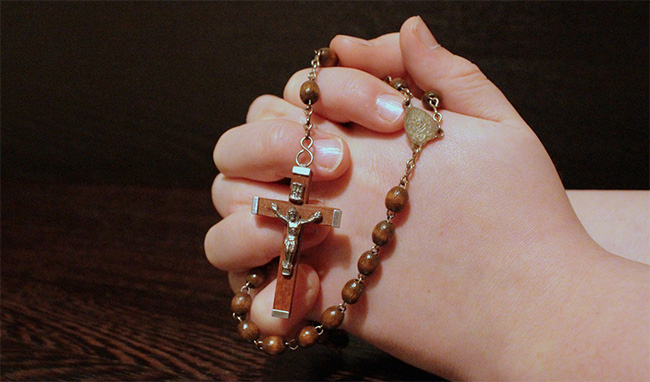Devotion to Mary: the Holy Rosary, Christian school of life
In his Apostolic Letter on the Rosary, Pope John Paul II wrote that "the Rosary, if rediscovered in its full meaning, brings to the very heart of Christian life and offers an ordinary and fruitful spiritual and pedagogical opportunity for personal contemplation, formation of the People of God and the new evangelization ».
Knowledge and love for the Holy Rosary, therefore, are not only a school of Christian life, but lead "to the very heart of Christian life," teaches the Supreme Pontiff. Furthermore, if the Rosary has been considered "compendium of the Gospel" and "school of the Gospel", even more, according to Pope Pius XII, it can be considered a true and precious "compendium of Christian life".
Therefore, the substance of the Christian life is learned from the Rosary school and "there is an abundance of grace," Pope John Paul II says, "almost receiving it from the very hands of the Mother of the Redeemer". After all, if in the Holy Rosary the Madonna teaches us the Gospel, then she teaches us Jesus, it means that she teaches us to live according to Christ, making us grow to the full "stature of Christ" (Eph 4,13:XNUMX).
Rosary and Christian life, therefore, seem to make a vital and fruitful union, and as long as love for the Holy Rosary lasts, in fact, true Christian life will also last. A bright example in this regard also comes from Cardinal Giuseppe Mindszenty, the great martyr of the communist persecution in Hungary, at the time of the iron curtain. Cardinal Mindszenty, in fact, had long years of tribulation and horrible harassment. Who supported him in fearless faith? To a Bishop who asked him how he managed to survive the many atrocities suffered, the Cardinal replied: "Two secure anchors kept me afloat in my storm: unlimited confidence in the Roman Church and the Rosary of my mother".
The Rosary is the source of pure and strong Christian life, persevering and faithful, as we know from the lives of many Christian families, where heroic holiness also flourished. Think, for example, of the fervent and exemplary Christian life of the families who fed the Rosary daily, such as the families of St. Gabriele dell'Addolorata and St. Gemma Galgani, St. Leonardo Murialdo and St. Bertilla Boscardin, St. Maximilian Maria Kolbe and of Saint Pio of Pietrelcina, of the blessed Giuseppe Tovini and of the blessed spouses Luigi and Maria Beltrame-Quattrocchi, together with many other families.
The Pope's lament and call
Pope John Paul II, in his Apostolic Letter on the Rosary, unfortunately had to painfully complain that once the prayer of the Rosary "was particularly dear to Christian families, and certainly favored its communion", while today it seems almost disappeared in most also Christian families, where it is clear that instead of the Rosary school there is the school of the TV, a teacher, mostly, of social and carnal life! For this reason the Pope is prompt in replying and calling back saying clearly and vigorously: "We must return to pray in the family and to pray for the families, still using this form of prayer".
But even for individual Christians, in every state or condition of life, the Rosary has been a source of coherent and luminous Christian life, from Saint Dominic to the present day. Blessed Nunzio Sulpizio, for example, a young worker, had only the strength from the Rosary to work under cruel mistreatment by his master. Sant'Alfonso de 'Liguori went on the back of a mule to make the canonical visit to the individual parishes through countryside and valleys along difficult paths: the Rosary was his company and his strength. Was it not the Rosary that supported Blessed Theophanus Venard in the cage in which he was imprisoned and tortured before martyrdom? And did Brother Carlo de Foucauld, who was hermit in the desert, not want Our Lady of the Rosary as patroness of his hermitage? The example of San Felice da Cantalice, the humble Capuchin religious brother, who for about forty years did the begging in the streets of Rome, always walking like this: "Eyes on earth, crown in hand, mind in heaven ». And who supported St. Pius of Pietrelcina in the unspeakable sufferings of the five bleeding stigmata and in the apostolic labors without measure, if not the crown of the Rosary that he continuously shelled?
It is true that the prayer of the Rosary feeds and sustains Christian life at all levels of spiritual growth: from the initial efforts of the beginners to the most sublime ascents of the mystics, to the even bloody immolations of the martyrs.
